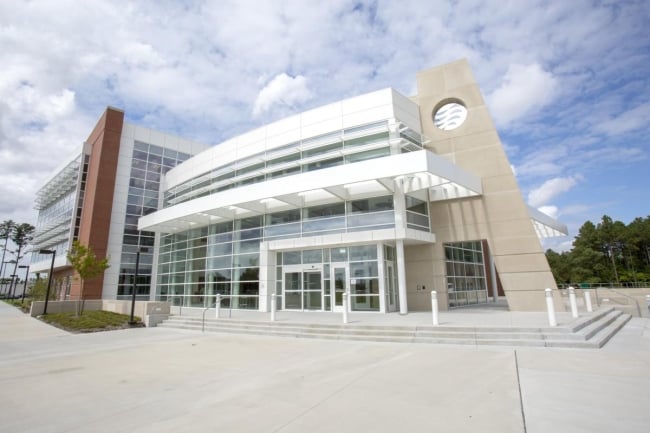You have /5 articles left.
Sign up for a free account or log in.

Tidewater Community College and others were targeted by bomb threats this week.
Tidewater Community College
A series of bomb threats this week targeted college campuses across the country, many of them community colleges. While no bombs have been found, the threats come amid a surge of such menaces this summer, which are concerning to law enforcement officials and college leaders, who say they’re disruptive to campus life and disturbing to students and employees.
Two Eastern Florida State College campuses closed and reopened after evacuations Wednesday in response to a bomb threat.
A slew of community colleges in Virginia were targeted Tuesday, including Eastern Shore Community College, Tidewater Community College, Virginia Peninsula Community College and Paul D. Camp Community College. Regent University and Norfolk State University, a historically Black institution, received threats, as well, according to 13News Now, an ABC affiliate news station in Virginia.
Karen Campbell, vice president of student affairs at Tidewater Community College, said Chesapeake Police Department officers and firefighters searched the campus after a threat around 11:20 a.m. Tuesday and determined the threat was unfounded. Summer is a “slower time at the college,” but she said some students, faculty and staff members were on campus for summer courses.
“Our priority is always to make sure that our students, faculty and staff are safe,” she said.
The Wheeling Police Department in West Virginia also received a call saying there was a bomb in the main campus building at West Virginia Northern Community College shortly before 1:30 p.m. Tuesday, which led the department to investigate. After the building was evacuated, an explosive-detection dog accompanied officers who searched in and around the building, said Philip Stahl, public information officer at the Wheeling Police Department. The department issued an all-clear announcement less than two hours later.
“Nothing was located,” Stahl said. “Obviously it was a hoax in nature, and we’re continuing to investigate the phone call that was made at this point.”
He noted that local media outlets have also reported threats at nearby institutions, so the department is reaching out to other law enforcement agencies to compare the threat calls. Threats came in that same afternoon at higher ed institutions in Ohio, including Belmont College, the Ohio University Zanesville and Zane State campuses, and Washington State Community College in Marietta. Carthage College in Kenosha, Wis., also received a threat Tuesday afternoon, Kenosha News reported.
“Obviously it’s rare … that all of these kind of happened at once,” Stahl said. “We’re doing our part to see where the [phone] number came from, who the individual was on that line. We’ll be talking to our local agents here at the FBI office to kind of alert them on what we know and what happened on our end. They’re able to investigate across the country, so they would probably take a more broad look at what the heck is happening here.”
The Federal Bureau of Investigation press office issued a statement saying that the agency “is aware of bomb threats received by multiple colleges and universities.”
“The FBI takes all potential threats seriously and we regularly work with our law enforcement partners to determine their credibility,” the statement read. “As always, we would like to remind members of the public that if they observe anything suspicious to report it to law enforcement immediately.”
Tuesday’s incidents are the latest surge in a barrage of threats that has been going on for weeks.
For example, Ogden-Weber Technical College in Utah was evacuated July 6 because of a bomb threat and resumed normal operations the next day.
“The College thanks our security staff, employees and students for following established safety protocols resulting in a safe and swift evacuation of the campus,” reads a statement from the college. “A special thanks to our outstanding law enforcement and emergency services partners who helped secure and clear the campus.”
Two Austin Community College campuses, the Alkek Fine Arts Center at Weatherford College, the University of North Texas Health Science Center and Dallas College’s Richland campus received threats on July 7.
“Evacuate location by foot immediately,” Dallas College tweeted. “Move as far as possible from building(s). Not at site? STAY AWAY for your own safety.”
Cleveland State University received a threat the next day, as did the University of Providence in Montana and at least four institutions in Maryland, including Carroll Community College, Hagerstown Community College, St. Mary’s College of Maryland and Wor-Wic Community College.
Robert Mueck, director of public safety at St. John’s College in Maryland and a member of the domestic preparedness committee for the International Association of Campus Law Enforcement Administrators, said his email was “blowing up” as campus public safety officers conferred on email Listservs about the growing number of threats.
“Communications were bouncing back and forth,” he said. “We were very much on top of it. People are talking about it.”
The latest threats also come after bomb threats swept historically Black colleges and universities nationwide earlier this year, taking a toll on the mental health of students, faculty and staff members and prompting a congressional hearing in March.
While bomb threats are usually unfounded, “that doesn’t mean [students] aren’t going to be scared,” Mueck said. “There are some students who are absolutely shook up about it.”
Some students, parents and employees of the colleges have been posting on social media about their shock and concern about the bomb threats.
“MY COLLEGE GOT A BOMB THREAT EARLIER WHAT,” one student wrote on Twitter. “Everyone’s fine and the campus is reopening now after an hour and a half but WHAT.”
“My college kid is home early today because some idiot called in a bomb threat on campus,” a parent tweeted. “Thankful he’s safe, but frustrated that we live in a world like this.”
Mueck believes more bomb threats against campuses are happening because technology today makes it easier to make anonymous calls, and teenagers in particular “egg each other on” to make these calls over social media. For example, he highlighted the case of a teenage gamer who was reported to be involved in a spate of bomb threats in 2021, and that of a group of people using Discord, an instant messaging platform. He’s struck, however, by the number of community colleges being targeted and said he doesn’t know why these institutions have become a focus of those making the threats.
James Shaeffer, president of Eastern Shore Community College, said from his perspective, the threat against his college felt like a “one-off” incident rather than any kind of concerted effort to target community colleges. The college had to evacuate middle school and high school students on campus for summer camps, but law enforcement officials swiftly determined there was no bomb.
“If anything, it was inconvenient,” he said.
Martha Parham, senior vice president of public relations for the American Association of Community Colleges, said she is monitoring the threats, “But I’m not sure if there is an increase in occurrences or if we’re just hearing about it more often now with social media.”
Community college presidents are nonetheless “always concerned about the safety of their students and their teams, their faculty and staff” and have plans in place for potential threats, she added.
She also noted that it’s sometimes easier for community colleges to keep students safe in the event of a threat because the colleges often don’t have students living in dorms.
Mueck said law enforcement officials and campus leaders need to strike a balance between “not overreacting but not failing to react.”
“It’s the cheapest form of terrorism there is,” he said. “It’s the cheapest form of harassment. You have to do something, but some of these campuses are shutting down completely, sending everyone home or taking other kinds of action. And it really impacts the academic program of the institution. We have to be careful about that, because with the press of a phone call, you can make a college campus just go haywire.”
He said that’s exactly what people who make these threats want.
“Threats are made to create anxiety,” he said. “The person making the threat wants you to react.”









